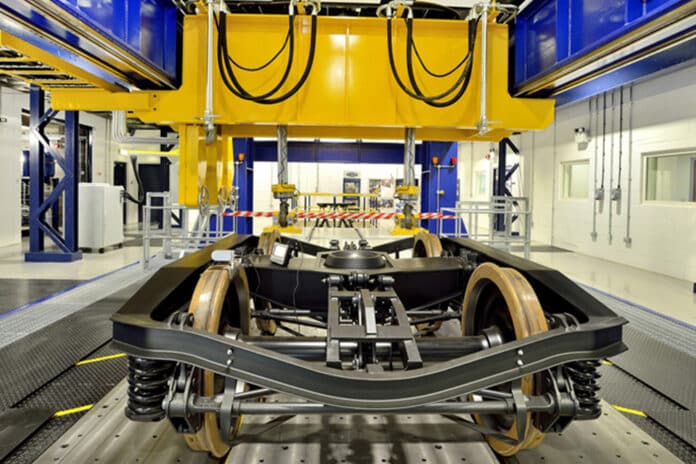A £1 million upgrade is currently underway on the UK’s only full-size railway bogie test rig based at the Institute of Railway Research (IRR) at the University of Huddersfield.
It is to include the integration of a real-time train braking performance model as well as the capability to prove novel hybrid drivetrains and energy storage systems. This will broaden the University’s rail research capabilities and allow the IRR to provide essential support to the railway industry in overcoming its wider decarbonisation and electrification challenges.
As a result of £1 million of capital funding provided through the UK Rail Research and Innovation Network (UKRRIN), the soon to be launched ‘HAROLD 2.0’, is a full-scale bogie test rig built upon the existing HAROLD facility opened at the IRR in 2016.
Commissioned as the UK’s only full-size rig of its kind, it features a motored rolling road that can drive a wheelset of a standard gauge bogie at speeds up to 200kph, exerting real-world forces via its hydraulic actuation system.
In partnership with engineering consultants Ricardo, who are delivering the upgrade, the funding will provide significant enhancements to the facility’s functionality, including the integration of a real-time train braking performance model and a fully functional AC power bogie, comprising both friction and regenerative brake systems and complete traction package.
Professor Paul Allen, assistant director IRR, said: “In helping realise predictable and optimised traction and braking performance the HAROLD 2.0 test rig will contribute to delivering a safer, more reliable and higher capacity railway.
“Through testing and development of hybrid vehicle concepts, it will support the railway industry in overcoming its wider decarbonisation and electrification challenges.”
By utilising the capability of hardware-in-the-loop (HiL) test methods, on-train systems including next-generation wheel-slide protection (WSP) and dynamic brake blending control, traction components will be able to be fully analysed. The test environment will have the ability to re-create whole-route traction and braking duty-cycles at speeds of up to 200kph, under a range of wheel-rail adhesion conditions, thereby providing an invaluable proving stage prior to on-track trials.
With provision for battery banks and fully configurable real-time models, the test rig will also provide the capability to prove novel hybrid drivetrains and energy storage systems, enabling hardware and software solutions to be trialled in a controlled but realistic environment.
Photo credit: University of Huddersfield







































 0113 2082620
0113 2082620 info@railbusinessdaily.com
info@railbusinessdaily.com 15 Mariner Court, Wakefield WF4 3FL
15 Mariner Court, Wakefield WF4 3FL

